Next to Normal
Brian Yorkey (Book & Lyrics); Tom Kitt (Music)
Ray of Light Theatre
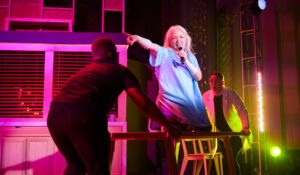
Lifelong mental disease, paralyzing grief, severe depression, feelings by a child of a parent’s abandonment, drug abuse, the questionable practices of modern psychiatry, suicide. While not the subjects normally associated with the Great American Musical, Brian Yorkey (book and lyrics) and Tom Kitt (music) decided otherwise in 2009 as their Next to Normal premiered on Broadway, ultimately winning three Tony Awards and becoming only the eighth musical to win the Pulitzer Prize for Drama.
For all these potentially depressing topics, a musical that deals with their oft-devastating effects on a suburban family is in the final moments still uplifting, inspiring, and hopeful. Even without having the kind of feel-good, happily-ever-after ending most often associated with staged musicals., Next to Normal surrounds its audience with a concluding hope that even in a severe crisis like a mother’s worsening, bipolar disorder, “When we open up our light, sons and daughters, husbands, wives, can fight that fight … There will be light” (“Light”).
As the company has done for twenty-five years, Ray of Light Theatre once again tackles a tough topic — a topic many other performing arts companies often avoid — and produces a powerfully captivating, emotionally authentic, and musically arresting production. As the company has done with such musicals as Carrie, Hedwig and the Angry Itch, Silence the Musical, and Lizzie the Musical, Ray of Light stages a Next to Normal that boldly and unabashedly presents some of life’s darkest moments in a musical guaranteed to leave its audiences with a sense of renewal and a smile amid their tears.
As they prepare for “Just Another Day,” four members introduced to us by the mother, Diana Goodman, describe individually in intertwined harmonies of a daily routine that “only hurts when I breathe/try/think/cry/play/move.” For mother, father, son, and daughter, “it’s just another day” where “you wish you would be gone, but you’ll stay.”
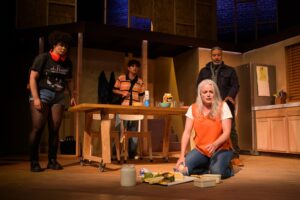
In an attention-grabbing beginning with voices lifting individually and collectively as family members rush about to begin their day, we immediately get a harsh and vivid glimpse of what it must be like to be a part of a household where mental illness resides. Increasingly frenetic Diana is suddenly on the kitchen floor with bread all around her as she manically tries to make luncheon sandwiches, her family looking on in stunned, sad silence. Yes, for the Goodmans, “It’s just another day.”
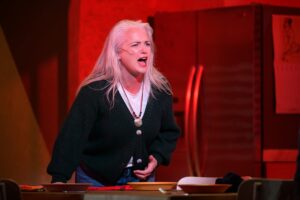
Anne Warren Clark paints a jaw-dropping, heart-touching portrait of what it is like for her portrayed Diana Goodman to walk precariously the wobbling fence between surviving another day with as many brave-faced smiles as possible and succumbing to the recurring vision of a painful loss that has become her unreal, daily reality. With a countenance that alternates between one lit up as shining in the sun’s rays and one with the look of a deer facing oncoming headlights, her Diana sings of her “manic, magic days” and “dark, depressing nights” with a voice that strikes to the core with its desperation. Surrounded by pills of every color in bottles prescribed aplenty, she sings, “I miss the mountains … I miss the pain … I miss my life.”
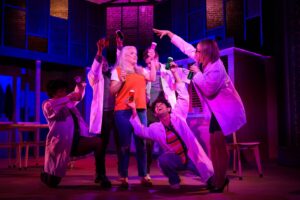
For sixteen years, Diana has been in and out of doctors’ offices only to find herself in a place where “nothing’s real.” The inability for anyone – family or doctors – truly to understand what she goes through every hour of her day comes out in hard-pounded notes succumbing to painful notes sustained as she sings to her husband, “You Don’t Know.” At times, her tightened cheeks and widened eyes seem as if her entire face will break apart.
Diana’s exhausted frustration of failed prescriptions and advice comes to a head in full on hard-rock fashion as in defiance she reacts to both her husband and her doctor pushing her to undergo brain-and-memory-altering shock treatments: “I know where you’re going, and I know what this is about, cause I’ve seen this movie, and I walked out.” Even as treatments erase parts of her past, Anne Warren Clark’s breath-taking portrayal of Diana’s journey to recapture some control of her life and her destiny is stunning.
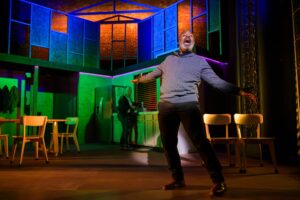
With a voice that intones over and again in beautiful and haunting notes what it is like to be the other half of a spouse’s long-term, life-threatening depression, Albert Hodge is authentically genuine and convincing as Diana’s husband, Dan. When we first meet him, his Dan does all he can to keep a stiff upper lip and to imbue a sense of we can do this, “it’s gonna be good.” But even as he sings repeatedly that phrase, a family around him spins in mad-house circles like a birthing tornado as their repeatedly sung”gonna be good” phrases also spin out of control.
Dan’s own scary, lonely experiences of possibly facing a life without his wife after all the hell he has already known is heart-achingly sung in “I’ve Been” with notes encompassing his combined pain, exasperation, and anxiety. And yet, with vocals that range at times in falsetto search, Albert Hodge’s Dan sings, “I swear somewhere in the night, there’s a light.”

Maia Campbell is Natalie, in many ways the typical teenage daughter of any household. Natalie is a roller-coaster of changing emotions, a kid whose focus is often first-and-foremost on herself and her own needs and wants. She is also a daughter who is often at odds with her parents – especially with a mother who has largely not been there for her for any of her sixteen years of life. Time and again, Maia Campbell strikes in shockingly mature vocals at the heart of a young girl’s fears and frustrations as she finds herself in the middle of a family where everyone is singing, “Catch me, I’m falling.”
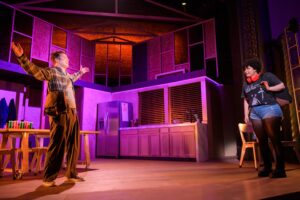
Natalie’s sometimes successful escape is her piano and love of music, a pursuit that has resulted in the long-time and secret admiration of a classmate, Henry. Yet another talented voice capable of both aching beauty and powerful trumpeting emerges as Andrew Cope’s Henry persistently tries to convince Natalie, “I’m perfect for you.” The relationship that develops with its own ups and downs between Natalie and Henry is an underlying story thread that has a strong message of the power of having a true friend like Henry whose love endures many bumps and rejections as Natalie navigates living in a family in crisis.
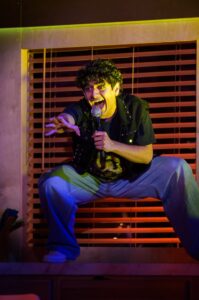
The fourth member of the Goodman family is the older brother of Natalie whose name, Gabe, we do not hear spoken until deep into Act Two. While Gabe is often present moving about the family, it is only he and his mom who interact. Gabe seems in a competition with his dad to prove to his doting mom that “I Am the One” – the one “who knows you,” “who cares,” “who’s always been there,” and “who needs you.” In a kind of strange love triangle, both Gabe and Dan are soon singing a competitive, compelling “I Am the One” to Diana.
Roeen Nooran sings in a celestially clear and soothingly high voice as he tries both to assure his mother of his undying love and to lure her into “a world out there … where we can be free.” Often crouching on all fours and moving about like a cat about to pounce on its prey, his Gabe is totally focused on a mom who is frozen in her grief for a baby she remembers once in her arms seventeen years ago.
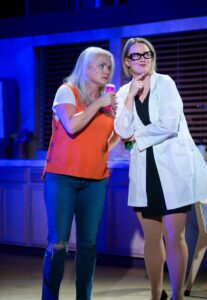
The final member of this stellar cast is Courtney Merrell, doubling in roles as both the pill-pushing Dr. Fine and the electric-shock-prescribing Dr. Madden. With impressive soprano vocals that can both soothe to console and demand to near coerce, her doctors are helpful to the point of debilitating with healing alternatives that can come with their own demons.
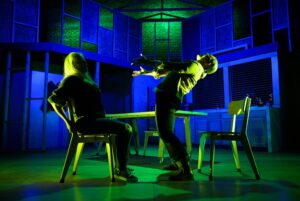
Jenn Bevard directs with an uncanny mixture of tenderness and ferocity, empathy and harsh reality, whirlwind frenzy and sudden, stark moments of freeze. As director, every inch of Matt Owens’ two-tiered set becomes a potential spot for a son’s shadowy observations, a daughter’s haven for checking out, a husband’s search for answers, or a wife and mother’s pivot between self-destruction and self-exploration. Christian Mejia’s lighting becomes a seventh character of the story, with shifting tones of color, focused spots, slithering shadows, and sudden floods of light — all enhancing the moods, the thoughts, the trepidations, the realizations, and the resolutions of the people we meet.
Tom Kitt’s score is given masterful interpretation by music director Jad Bernardo and the other five members of the band we see peeking behind the kitchen window’s screens. Singular instruments often sing in mesmerizing duets with the actors onstage, especially Amanda Dee’s violin and Myra Chachkin’s cello.
The Goodwill family learns and teaches us an important life message in Ray of Light Theatre’s spell-bounding, heart-rendering production of Next to Normal as they sing in the finale, “The price of love is loss but still we pay, we love anyway.” In glorious harmony, each facing us now with a new hope shining through faces still scarred with pain, they sing,
“And when the night has finally gone.
And when we see the new day dawn.
We’ll wonder how we wandered for so long, so blind.
The wasted world we thought we knew,
The light will make it soon brand new,
So, let it shine …. There will be light.”
Rating: 5 E- MUST-SEE
A Theatre Eddys Best Bet Production
Next to Normal continues through June 21, 2025, in a two-hour (plus intermission) production by Ray of Light Theatre at the Victoria Theatre, 2961 16th Street, San Francisco. Tickets are available at https://www.rayoflighttheatre.com/.
Photo Credits: Ben Krantz Studio

Leave a Reply